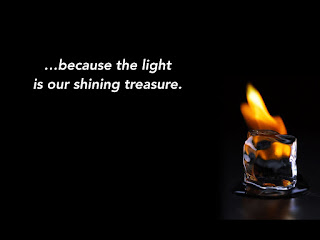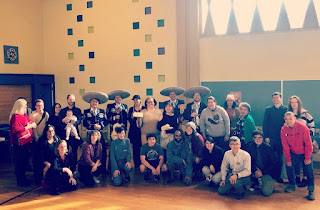God’s theatre is ubuntu
Matthew 25:31-46
Let’s imagine that we perform today’s reading in a theatre. In the play we are the righteous ones who ask the king, “When was it that we saw you hungry and gave you food, or thirsty and gave you something to drink? And when was it that we saw you a stranger and welcomed you, or naked and gave you clothing?” Jesus is the king who answers back to us, “Just as you did it to one of the least of these who are members of my family, you did it to me.” Let’s also imagine that we are in an interactive play which allows some participation from the audience (ourselves) with the lead actor (Jesus). I have heard from many people about how Immanuel appreciates the tradition of Dessert Theatre. You all know that the presentation of any play requires the art of collaboration, work and creativity shared by diverse people, unique talents. The process can be both exhausting and exhilarating. I will be excited to experience how Dessert Theatre has been an exciting part of our culture. I am interested because church is supposed to be like theatre. Theatre can be a very good model for how we do church because theatre gives people the opportunity to come together to share a space, and a spiritual and emotional connection. It is a dynamic time, a conversation, a chance to experience ubuntu.
Last Thursday, my husband and I gave ourselves a golden opportunity. We bought two tickets to enjoy the play Ubuntu: the Cape Town Project. (By the way, it runs until tonight, Nov 26, at the Prairie Theatre Exchange.) The night spent watching the excellent play was a great evening; we even had a glass of wine. In fact, this was the first time we’ve gone to the theatre in Canada. Since our kids have grown up a little, we have time to get out of the house and enjoy ourselves as a couple. Yes! Now we can quench our thirst for some culture - great progress for a young immigrant family!
Ubuntu is the philosophy and ethic which can be captured in a few memorable statements: “I am because you are, and you are because I am” or “I am what I am because of who we all are.” It has become widely known outside of Southern Africa - especially South Africa - through the ubuntu theology of Desmond Tutu, overcoming Apartheid. Ubuntu has fascinated me ever since I first learned about it some years ago. At the time, I immediately saw that ubuntu is a necessary evolution for our Christian faith; it is especially timely in these acrimonious days of division. Ubuntu teaches us to seek right knowledge about other cultures and people and who we are, and strengthen our links to each other.
As Richard Wagamese, an Objibway writer from the Wabaseemoong First Nation in northwestern Ontario wrote in his book, Embers, “I’ve been considering the phrase ‘all my relations’ for some time now. It’s hugely important. It’s our saving grace in the end. It points to the truth that we are related, that we are all connected, that we all belong to each other… The most important word is ‘all’. Not just those who look like me, sing like me, dance like me, speak like me, pray like me. ALL my relations. That means every person, just as it means every rock, mineral, blade of grass, and creature. We live because everything else does.”
What I learn from Wagamese’s words is our world is a big theatre of ubuntu. The most exciting message is that we all are different, yet strive to find a common and authentic language of love and voices acknowledging that we are one humanity. The 21st century is really a new age when we need to rethink our ways along ubuntu pathways, in all relations. People migrate between continents through pain and hope. This era calls us: we who don’t look the same, don’t sing the same, don’t dance the same, don’t speak the same, don’t pray the same, must come together to work together. Ubuntu means that we are intrinsically interlinked, and therefore have a responsibility to one another.
 |
| From Ubuntu: The Cape Town Project |
In addition, another aspect last Thursday’s play opened up to me was that in African tradition, ubuntu is much bigger than the secular, disenchanted, Westernized scientific/medical worldview about life, health, and the universe. Ubuntu touches deeply to our innate sense of interconnectedness with spiritual dimensions and even ancestors. You speak to your ancestors and those who have gone before, through prayer, through ritual - though real human love. The world is so dynamic. Our relations encompass everything in time. The past and the present are interconnected through lives. Ubuntu is the beautiful depiction that explains how we are spiritually open to everything in every possibility. Therefore, all people, all beings, all things know that they have a place, they belong, they are true, they are respected, they are connected.
Here’s my favourite story that taught me what it is really like to be a friend to someone who does not look like me, sing like me, dance like me, speak like me. That was the moment when I learned that culture is the essence of what makes human beings human and unique. Personally, African cultures, while I acknowledge that African culture is not monolithic but consists of many different cultures, really inspire me. I laugh with learning. I met a young Kenyan woman in Geneva, Switzerland. I was selected as a young adult to represent the UCC, Canada, as a student steward among 20 young people from all over the world who served at the Central Committee meeting of the World Council of Churches. This young woman, Gloria Mabonga, from Kenya, was 3-5 years younger than me. She was late arriving in the first week, so she was looking for a friend during the rest of the two weeks there. I think I was chosen :) What I immediately learned from her was I was meeting a person who came from a completely different culture, one which has completely different expectations about friendship and relationships. She seemed to believe that if I am her friend, I should act on the criteria which are obvious to her from her cultural understanding of friendship but not so obvious to me! This difference created intercultural “thrills”.
I can highlight three of them. My second Kenyan friend confirmed that two of the three are really Kenyan customs. I’ll tell you the three - and you guess which are the two Kenyan customs and which is just Gloria. (Like Two truths and a lie.)
The first thing Gloria asked me to do for her (and it was only the second day) was combing her braided hair with special oil. She said that’s what friends do in Kenya. The second thing was this: we were on the way back from a museum, and we got tired. Gloria said: “I need to go to the washroom.”
I nodded, telling her with my body language, “Go and find it for yourself.”
However, she stood there, not moving, as if she was insisting on something. She looked at me for some seconds, and finally said, “You need to come with me. That’s how we do for each other.”
The third was that we were in the botanical garden (the picture). At the center of that glass building was the staircase to go up to the top, and in front of us was a tall, big palm tree. She looked at me. This time, I got a little scared. “Ha Na. Can I jump?” “What?”
“I can jump to the tree to get down to the floor. It’s easy to us. Can I do it?” “Oh no… Don’t.” I grabbed her hand to go down with me. My second Kenyan friend laughed to hear this and said, certainly that’s Kenyan.
Jesus’ stories are Jesus’ theatre. In his theatre, we learn how we speak, how we sing, how we dance, and how we pray, and how we play our role as if we act along with Jesus, with God being the creative director. In the new play, in God’s Kin-dom, we act as if we are the close kin to each other because we are. How we sing a song of authentic love to each other, how we share our responsibilities to one another makes us dynamic. It is really an ubuntu kind of character. Jesus’ theatre is ubuntu.
Archibishop Desmond Tutu offered a definition of ubuntu in his 1999 book. “A person with ubuntu is open and available to others, affirming others, does not feel threatened that others are able and good, based from a proper self-assurance that comes from knowing that he or she belongs in a greater whole and is diminished when others are humiliated or diminished, when others are tortured or oppressed.”
Nelson Mandela also explained: “A traveller through a country would stop at a village and he didn’t have to ask for food or for water. Once he stops, the people give him food and attend him. That is one aspect of ubuntu, but it will have various aspects. Ubuntu does not mean that people should not enrich themselves. The question therefore is: Are you going to do so in order to enable the community around to be able to improve?”
“Just as you did it to one of the least of these who are members of my family, you did it to me.” is really about how we become ubuntu, how we find the face of Christ in the world. Jesus invites us to jump up to the stage to participate and act with him; to take time to think of everything in light of spirituality: how we speak with people, how we sing with people, how we dance with people, and even how we “jump” up OR down the stage with other fellow actors in God’s theatre, because, like you see in Jan Richardson’s picture Christ among the Scraps (Please follow the link to see her picture:
http://paintedprayerbook.com/2008/11/19/christ-among-the-scraps/), the face of Christ is yet to be discovered in the beautiful scraps among us.
http://paintedprayerbook.com/2008/11/19/christ-among-the-scraps/), the face of Christ is yet to be discovered in the beautiful scraps among us.
















%5EJ%202023.jpg)
